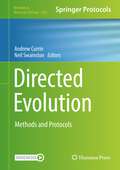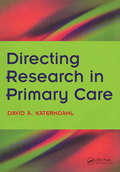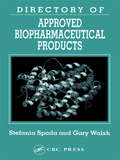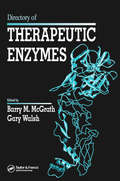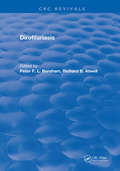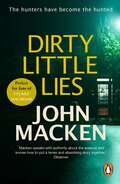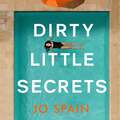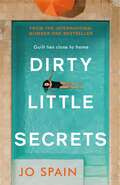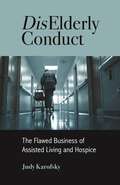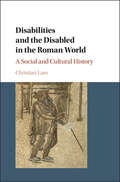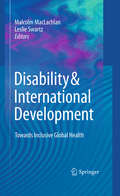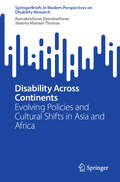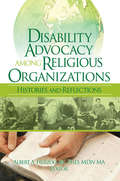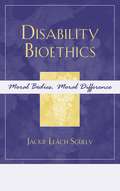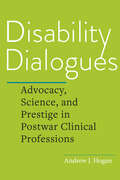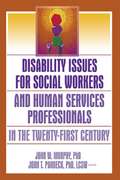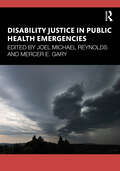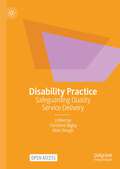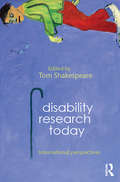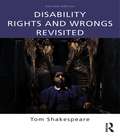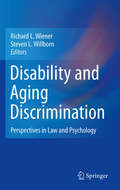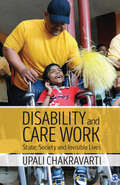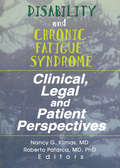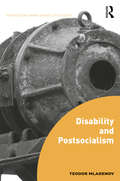- Table View
- List View
Directed Evolution: Methods and Protocols (Methods in Molecular Biology #2461)
by Andrew Currin Neil SwainstonThis volume explores the latest techniques used by researchers to study directed evolution (DE) at each stage of the Design-Build-Test-Learn cycle. Chapters in this book cover topics such as designing overlap extension PCR primers for protein mutagenesis; antha-guided automation of Darwin assembly for the construction of bespoke gene libraries; rapid cloning of random mutagenesis libraries using PTO-Quickstep; and DE of glycosyltransferases by a single-cell screening method. Written in the highly successful Methods in Molecular Biology series format, chapters include introductions to their respective topics, lists of the necessary materials and reagents, step-by-step, readily reproducible laboratory protocols, and tips on troubleshooting and avoiding known pitfalls. Cutting-edge and comprehensive, Directed Evolution: Methods and Protocols is a valuable resource for scientists and researchers who are interested in learning more about this field and incorporating these studies into new experimental workflows.
Directing Research in Primary Care: Bk. 2, Going Clinical
by David A. Katerndahl Kenneth M. BoydThis is a highly practical book that focuses on the specifics of development in primary care research units. It discusses development of both research units and researchers themselves and offers helpful case studies that include an in-depth look at the development of one particular research unit. The issues and approaches used are applicable to all primary care researchers and administrators in medicine around the world. "Directing Research in Primary Care" is an easy to read, no-nonsense guide that provides invaluable information and guidance to individual researchers with, or contemplating, leadership roles, and deans, chairs and research directors supporting primary care research.
Directory of Approved Biopharmaceutical Products
by Gary Walsh Stefania SpadaBiopharmaceuticals, the term for genetically engineered therapeutic proteins, monoclonal antibodies, and nucleic acid-based products, have become an increasing part of the pharmaceutical armament. While this category of drugs accounts for approximately 25% of all new drugs coming to market, very few references exist that review these commercially a
Directory of Therapeutic Enzymes
by Gary Walsh Barry M. McGrathCarefully crafted to provide tightly focused and authoritative information, the Directory of Therapeutic Enzymes covers all approved therapeutic enzymes currently used in medicine. Written mainly by industry experts, the book includes information sourced directly from the company that developed or manufactured the product. It explores major
Dirofilariasis
by P. F. BorehamHeartworm disease is probably the most well-known disease of dogs, and its epidemiology is being recorded in those countries in which the disease is routinely treated in the domestic dog. It is hoped that this text will be of benefit to us all and that our understanding of this disease will continue to grow and so enable us to resolve some of the exsiting problems associated with the treatment of this disease. To this end, the book aims to project some hypotheses in different areas that, while unproven, seem to be the most probable, based on our current knowledge.
Dirty Little Lies: (Reuben Maitland: book 1): A hard-hitting, powerful thriller you won’t be able to put down
by John MackenThis compelling and gripping novel by bestselling author John Macken takes the forensic thriller to the next level. Perfect for fans of Kathy Reichs, Karin Slaughter and Patricia Cornwell. "A tense and absorbing story..." - OBSERVER"I was gripped from start to finish." -- ***** Reader review"A cracking read" -- ***** Reader review"This was dark at times...but kept me hooked and interested all the way. More please!" -- ***** Reader review"I spent two days gripped unable to put it down. It is a well written, well constructed forensic thriller, which leaves you guessing until the final pages and then you are given a final shock..."-- ***** Reader review*****************************************************THE HUNTERS HAVE BECOME THE HUNTED...Reuben Maitland runs the UK's most elite crime squad, working only on the highest-profile cases, tracking down the country's most vicious criminals. The squad have always made enemies but now they're in danger: a killer is using their own techniques against them. Reuben must find the killer before his team is eradicated. But the more questions he asks, the more complex the answers become. And as the case unravels, so his own personal life collapses...Not only is he fighting to save the lives of his colleagues, he is fighting for his own professional and personal survival. The choices he makes will determine his future. When he makes the wrong one, he finds himself alone on the outside of the law, at the mercy of a seemingly unstoppable killer...
Dirty Little Secrets: An utterly gripping thriller from the author of The Perfect Lie
by Jo SpainTHE INCREDIBLY GRIPPING THRILLER FROM THE BESTSELLING AUTHOR OF THE PERFECT LIE*********In the exclusive gated community of Withered Vale, people's lives appear as perfect as their beautifully manicured lawns. Money, success, privilege - the residents have it all. Life is good.There's just one problem.Olive Collins' dead body has been rotting inside number four for the last three months. Her neighbours say they're shocked at the discovery but nobody thought to check on her when she vanished from sight.The police start to ask questions and the seemingly flawless façade begins to crack. Because, when it comes to Olive's neighbours, it seems each of them has something to hide, something to lose and everything to gain from her death.*********PRAISE FOR JO SPAIN'Loved, loved, loved' Caz Frear'Dark, funny, well-plotted, sinister' Will Dean'You certainly look at your neighbours with fresh eyes after reading this' Yours(P) 2020 Quercus Editions Limited
Dirty Little Secrets: An utterly gripping thriller from the author of The Perfect Lie
by Jo SpainTHE INCREDIBLY GRIPPING THRILLER FROM THE BESTSELLING AUTHOR OF THE PERFECT LIE*********In the exclusive gated community of Withered Vale, people's lives appear as perfect as their beautifully manicured lawns. Money, success, privilege - the residents have it all. Life is good.There's just one problem.Olive Collins' dead body has been rotting inside number four for the last three months. Her neighbours say they're shocked at the discovery but nobody thought to check on her when she vanished from sight.The police start to ask questions and the seemingly flawless façade begins to crack. Because, when it comes to Olive's neighbours, it seems each of them has something to hide, something to lose and everything to gain from her death.*********PRAISE FOR JO SPAIN'Loved, loved, loved' Caz Frear'Dark, funny, well-plotted, sinister' Will Dean'You certainly look at your neighbours with fresh eyes after reading this' Yours
Dirty Little Secrets: The twisty and addictive thriller from the bestselling author of Six Wicked Reasons
by Jo SpainFROM THE NUMBER ONE BESTSELLING AUTHOR OF THE CONFESSION AND THE PERFECT LIESix neighbours, six secrets, six reasons to want Olive Collins dead.In the exclusive gated community of Withered Vale, people's lives appear as perfect as their beautifully manicured lawns. Money, success, privilege - the residents have it all. Life is good. There's just one problem. Olive Collins' dead body has been rotting inside number four for the last three months. Her neighbours say they're shocked at the discovery but nobody thought to check on her when she vanished from sight. The police start to ask questions and the seemingly flawless facade begins to crack. Because, when it comes to Olive's neighbours, it seems each of them has something to hide, something to lose and everything to gain from her death. The thrilling psychological thriller from the bestselling author of The Perfect Lie, perfect for fans of Liane Moriarty, C. L. Taylor and Sarah Pearse.PRAISE FOR JO SPAIN, THE HOTTEST NEW TALENT IN PSYCHOLOGICAL THRILLERS'Enthralling' JP Delaney'Chilling' Sunday Times'Arresting' Sunday Express'Brilliant' BA Paris'Gripping' Best'Compulsive' Sunday Mirror'Addictive'Michelle Frances'Refreshing'Express
DisElderly Conduct: The Flawed Business of Assisted Living and Hospice
by Judy KarofskyThe book is a personal account of unmet needs in assisted living and hospice aiming to spark discussions about new approaches for America’s aging population and family decision makers. There are 30 thousand assisted living facilities in the US, but most are unaffordable for middleclass Americans and fraught with staffing deficiencies and mismanagement. Chapters on the author’s experience helping her mother move from an age-restricted community in Florida to independent living in Wisconsin to assisted living will interest seniors and their family members who know the struggle of finding long term affordable care. The chapter on hospice care distinguishes it from assisted living through the author’s experiences and misconceptions, then moves to a broader discussion of Medicare spending, and finally a meditation on dying of old age. The author strikes an effective balance between the personal, political, and cultural aspects of aging. Karofsky dedicates the last chapter of the book to a discussion of recent failures to protect long term care patients during the COVID19 pandemic.
Disabilities and the Disabled in the Roman World: A Social And Cultural History
by Christian LaesAlmost fifteen per cent of the world's population today experiences some form of mental or physical disability and society tries to accommodate their needs. But what was the situation in the Roman world? Was there a concept of disability? How were the disabled treated? How did they manage in their daily lives? What answers did medical doctors, philosophers and patristic writers give for their problems? <P><P>This book, the first monograph on the subject in English, explores the medical and material contexts for disability in the ancient world, and discusses the chances of survival for those who were born with a handicap. It covers the various sorts of disability: mental problems, blindness, deafness and deaf-muteness, speech impairment and mobility impairment, and includes discussions of famous instances of disability from the ancient world, such as the madness of Emperor Caligula, the stuttering of Emperor Claudius and the blindness of Homer.<P> The first scholarly study of the subject in English.<P> Comprehensively engages with literary sources, legal texts, epigraphy and papyrology, as well as with material evidence such as iconography.<P> Adopts an explicitly comparative approach which constantly seeks dialogue with new approaches and studies concerning other periods.
Disability & International Development
by Leslie Swartz Malcolm MaclachlanOne of the greatest challenges facing modern global health is how to include the most marginalized and impoverished people in international efforts to promote social and economic development. In Disability and International Development disability rights are situated within the broader context of global health and the need for much greater inter-sector collaboration. Reports from a broad cross-section of low- and middle-income countries--locales as diverse as Zimbabwe, Bolivia, Kyrgyzstan, and Papua New Guinea--move beyond surface discussions of "what is working" and "what shows promise" to discuss political and governance contexts, the roles of disabled persons in research by outsiders, concurrent struggles (e.g., women's or children's rights), and instructive inroads made by community activists and national Disabled People's Organizations. The results are provocative, and offer new lenses for viewing both the issues and the populations they affect. Each of the book's chapters spotlights a topic as representative of the enormity and immediacy of challenges to inclusive global health, including: The impact of international human rights law on domestic law and local traditions. The effect of failed states on the lives of people with disabilities. Empowerment and advocacy: disability organizations and movements. HIV/AIDS interventions with disabled persons. Assistive technologies in low-income countries. Strategies for improving the lives of children with disabilities. Cross-disciplinary as well as cross-cultural, Disability and International Development will attract a wide audience of professionals in rehabilitation, social welfare and human rights; governmental and non-governmental organizations and disabled people's organizations; researchers and practitioners. It will also be relevant to those working in health and welfare administration, health policy, international aid and development, and human rights. In addition, graduate students in disability studies, public and global health and international development should find this an important guide to the future of these fields.
Disability Across Continents: Evolving Policies and Cultural Shifts in Asia and Africa (SpringerBriefs in Modern Perspectives on Disability Research)
by Ramakrishnan Veerabathiran Sheena Mariam ThomasThis book offers a comprehensive exploration of the shifting landscape of disability rights and policies across two culturally rich and diverse continents. By adopting a multidisciplinary approach, the book integrates historical, cultural, socioeconomic, and technological perspectives on disability, providing readers with a broad understanding of the issues faced by disabled individuals in Asia and Africa. It examines the evolution of disability rights over time and the varying impacts of these changes on different communities. From traditional beliefs to modern societal structures, the book highlights how indigenous knowledge and local practices influence attitudes toward disability. A unique feature of the book is its focus on underexplored areas, such as the role of media in shaping disability narratives, the importance of sports in promoting social inclusion, and the rise of emerging technologies like AI and assistive devices in enhancing accessibility. By also focusing on grassroots movements, the growing influence of young advocates, and the need for sustainable future policies, the book not only reflects on past and present challenges but also offers forward-looking solutions. It serves as a vital resource for understanding how policy changes and cultural shifts can lead to more inclusive societies across Asia and Africa.
Disability Advocacy Among Religious Organizations: Histories and Reflections
by Albert A HerzogGain insight into the importance of advocacy for the disabled within various religious and secular organizationsYou shall love your neighbor as yourself. (Romans 13:9) Through the years, religious organizations have worked to fulfill this biblical mandate. Disability Advocacy Among Religious Organizations: Histories and Reflections chronicles the progress of different ministries&’ advocacy for the disabled since 1950 as they worked toward fulfilling this mission. This enlightening history of several religious organizations&’ efforts charts the trends in advocacy while offering readers insight into ways to assist people with disabilities both within religious organizations and in society. Issues are explored by drawing upon numerous documents, communications, and in-depth reviews of the advocates&’ work.This book draws together in a single volume the stories of various religious organizations and their struggles to advocate for the disabled. Because of society&’s tendency to isolate and fear them, special needs individuals such as the mentally and physically disabled have long found it difficult to be accepted, understood, or to receive proper care. However, ministries strive to be advocates for all of their members and their needs, including education, treatment, and appropriate legislation. Disability Advocacy Among Religious Organizations: Histories and Reflections recounts the steps organizations have taken to focus on ending isolation and fear through inclusion and appropriate care of members with various disabilities. These historical accounts examine the depth, breadth, and on-going need for disability advocacy in religious organizations.Disability Advocacy Among Religious Organizations: Histories and Reflections discusses the advocacy backgrounds of: the World Council of Churches the National Council of Churches National Catholic Partnership on Disability National Apostolate for Inclusion Ministry American mainline Protestant denominations-the American Baptist Convention, Disciples of Christ, the Episcopal Church, the Evangelical Lutheran Church in America, the Presbyterian Church USA, the United Methodist Church, and the United Church of Christ the Christian Reformed Church American Association on Mental Retardation (AAMR) Religion and Spirituality Division Bethesda Lutheran homes and Services, Inc. the Christian Council on Persons with Disabilities (CCPD) Friendship Ministries Joni and Friends the Mennonite advocacy for persons with disabilities the Religion and Disability Program of the National Organization on DisabilityDisability Advocacy Among Religious Organizations: Histories and Reflections is valuable reading for clergy and laypeople in disability advocacy in religious organizations, educators, students, seminary students preparing for ministries, and religious historians.
Disability Bioethics: Moral Bodies, Moral Difference
by Jackie Leach ScullyJackie Leach Scully argues that bioethics cannot avoid the task of considering the moral meaning of disability in humans--beyond simply regulating reproductive choices or new areas of biomedical research. By focusing on the experiential and empirical reality of impairment and drawing on recent work in disability studies, Scully brings new attention to complex ethical questions surrounding disability. Impairment is variously considered as a set of social relations and practices, as experienced embodiment, as an emancipatory movement, and as a biomedical phenomenon. In this way, disability is joined to the general late-twentieth-century trend of attending to difference as a significant and central axis of subjectivity and social life.
Disability Dialogues: Advocacy, Science, and Prestige in Postwar Clinical Professions
by Andrew J. HoganA historical look at how activists influenced the adoption of more positive, inclusive, and sociopolitical views of disability.Disability activism has fundamentally changed American society for the better—and along with it, the views and practices of many clinical professionals. After 1945, disability self-advocates and family advocates pushed for the inclusion of more positive, inclusive, and sociopolitical perspectives on disability in clinical research, training, and practice. In Disability Dialogues, Andrew J. Hogan highlights the contributions of disabled people—along with their family members and other allies—in changing clinical understandings and approaches to disability.Hogan examines the evolving medical, social, and political engagement of three postwar professions—clinical psychology, pediatrics, and genetic counseling—with disability and disability-related advocacy. Professionals in these fields historically resisted adopting a more inclusive and accepting perspective on people with disabilities primarily due to concerns about professional role, identity, and prestige. In response to the work of disability activists, however, these attitudes gradually began to change. Disability Dialogues provides an important contribution to historical, sociological, and bioethical accounts of disability and clinical professionalization. Moving beyond advocacy alone, Hogan makes the case for why present-day clinical professional fields need to better recruit and support disabled practitioners. Disabled clinicians are uniquely positioned to combine biomedical expertise with their lived experiences of disability and encourage greater tolerance for disabilities among their colleagues, students, and institutions.
Disability Issues for Social Workers and Human Services Professionals in the Twenty-First Century
by John W Murphy Jean A PardeckExamine issues of vital importance to you and your disabled clients-today and in the years to come!This groundbreaking text provides you with up-to-date, authoritative information that will prove to be of critical importance for disability professionals in the coming years. It will leave you better informed about aspects of disability that have not been well covered in the literature-issues surrounding spirituality, civil rights, and the "medical model vs. social (or minority) model" (of viewing disability) controversy. You&’ll examine the impact of the Americans with Disabilities Act in the wake of the Supreme Court&’s narrowing of the Act&’s powers and explore newly developed theories designed to more accurately define the true meaning of disability.Disability Issues for Social Workers and Human Services Professionals in the Twenty-First Century explores: the current-and potential-roles of spirituality and religion in the rehabilitation process the use of medication in treating disability-with a study focusing on children in foster care whose emotional/behavioral disabilities are medically (rather than psychologically) treated Attention-Deficit/Hyperactivity Disorder (ADHD) in college students-how it impacts them as a disability requiring academic accommodations disability as an aspect of cultural diversity-with suggested methods for educating the non-disabled about people with disabilities limitations on the civil rights of those with disabilities-and what can be done to eliminate those limitations computer technologies designed to aid people with disabilities-with an examination of a health promotion Web site for children with disabilities and their families disability and the managed mental health system-with an examination of the differences in service utilization and satisfaction in rural and urban areas how disability can be viewed as a social construct, rather than something that is inherent to the disabled personKeeping current with new developments is imperative for social workers and other professionals whose work affects people with disabilities. Disability Issues for Social Workers and Human Services Professionals in the Twenty-First Century provides the information you need to stay on the cutting edge of progress in this rapidly evolving field.
Disability Justice in Public Health Emergencies
by Joel Michael Reynolds Mercer E. GaryDisability Justice in Public Health Emergencies is the first book to highlight contributions from critical disability scholarship to the fields of public health ethics and disaster ethics. It takes up such contributions with the aim of charting a path forward for clinicians, bioethicists, public health experts, and anyone involved in emergency planning to better care for disabled people—and thereby for all people—in the future. Across 11 chapters, the contributors detail how existing public health emergency responses have failed and still fail to address the multi-faceted needs of disabled people. They analyze complications in the context of epidemic and pandemic disease and emphasize that vulnerabilities imposed upon disabled people track and foster patterns of racial and class domination.The central claim of the volume is that the ethical and political insights of disability theory and activism provide key resources for equitable disaster planning for all. The volume builds upon the existing efforts of disability communities to articulate emergency planning priorities and response measures that take into account the large body of qualitative and quantitative research on disabled people’s health, needs, and experiences. It is only by listening to disabled people’s voices that we will all fare better in future public health emergencies.The book will be of interest to scholars and graduate students working in bioethics, disability studies, public health policy, medical sociology, and the medical humanities.
Disability Practice: Safeguarding Quality Service Delivery
by Christine Bigby Alan HoughThis open access book critically engages with the social, political and ethical implications of support for people with disability to be fully included in society. The authors examine contemporary issues of quality and safeguarding in disability services, translating research and practice wisdom into foundational knowledge. Written by leading researchers, the book provides a comprehensive overview of knowledge and practice necessary to prepare readers to deliver enabling support.
Disability Research Today: International Perspectives
by Tom ShakespeareGrouped around four central themes – illness and impairment, disabling processes, care and control, and communication and representations – this collection offers a fresh perspective on disability research, showing how theory and data can be brought together in new and exciting ways. Disability Research Today starts by showing how engaging with issues around illness and impairment is vital to a multidisciplinary understanding of disability as a social process. The second section explores factors that affect disabled people, such as homelessness, violence and unemployment. The third section turns to social care, and how disabled people are prevented from living with independence and dignity. Finally, the last section examines how different imagery and technology impacts our understandings of disability and deafness. Showcasing empirical work from a range of countries, including Japan, Norway, Italy, Australia, India, the UK, Turkey, Finland and Iceland, this collection shows how disability studies can be simultaneously sophisticated, accessible and policy-relevant. Disability Research Today is suitable for students and researchers in disability studies, sociology, social policy, social work, nursing and health studies.
Disability Rights and Wrongs Revisited
by Tom ShakespeareOver the last forty years, the field of disability studies has emerged from the political activism of disabled people. In this challenging review of the field, leading disability academic and activist Tom Shakespeare argues that disability research needs a firmer conceptual and empirical footing. This new edition is updated throughout, reflecting Shakespeare’s most recent thinking, drawing on current research, and responding to controversies surrounding the first edition and the World Report on Disability, as well as incorporating new chapters on cultural disability studies, personal assistance, sexuality, and violence. Using a critical realist approach, Disability Rights and Wrongs Revisited promotes a pluralist, engaged and nuanced approach to disability. Key topics discussed include: dichotomies – going beyond dangerous polarizations such as medical model versus social model to achieve a complex, multi-factorial account of disability identity - the drawbacks of the disability movement's emphasis on identity politics bioethics - choices at the beginning and end of life and in the field of genetic and stem cell therapies relationships – feminist and virtue ethics approaches to questions of intimacy, assistance and friendship. This stimulating and accessible book challenges disability studies orthodoxy, promoting a new conceptualization of disability and fresh research agenda. It is an invaluable resource for researchers and students in disability studies and sociology, as well as professionals, policy makers and activists.
Disability and Aging Discrimination
by Steven L. Willborn Richard L. WienerTwo things are certain in the contemporary workplace: the aging of employees, and negative attitudes toward them - especially those with disabilities--by younger colleagues and supervisors. Yet related phenomena seem less clear: how do negative stereotypes contribute to discrimination on the job? And how are these stereotypes perceived in legal proceedings? Bringing theoretical organization to an often unfocused literature, Disability and Aging Discrimination offers research in these areas at the same level of rigor as research into racial and gender discrimination. The book applies Social Analytic Jurisprudence, a framework for testing legal assumptions regarding behavior, and identifies controversies and knowledge gaps in age-discrimination and disability law. Chapters provide historical background or present-day context for the prevalence of age and disability prejudices, and shed light on the psychosocial concepts that must be understood, in addition to medical considerations, to make improvements in legal standards and workplace policy. Among the topics covered: * Applying Social Analytic Jurisprudence to age and disability discrimination. * The psychological origins and social pervasiveness of ageism. * Growing older, working more: the boomer generation on the job. * Limitations of the Americans with Disabilities Act. * Disability and procedural fairness in the workplace. * Cross-cultural perspectives on stigma. The first volume of its kind, Disability and Aging Discrimination is essential reading for researchers, forensic and rehabilitation psychologists/psychiatrists, and those involved in the well-being of older and disabled workers.
Disability and Care Work: State, Society and Invisible Lives
by Upali ChakravartiDisability and Care Work: State, Society and Invisible Lives explores the lived reality of children with disabilities and those involved in parenting and caring for them. It discusses the extent to which the needs of the disabled and their caregivers have been met by health and welfare initiatives, and finds substantial gaps. The book describes vividly how the families of children with disability negotiate the uncertain journey of identifying their child’s disability, obtaining a diagnosis, accessing appropriate services and their ongoing efforts to reconcile with and recognise their child’s unique situation and mode of being. It critically examines the gendered dimensions involved in caregiving, the role of the state and civil society, and the legal and institutional frameworks in place. The book calls for inclusion of disability treatment at the primary care level, enhanced technology use for diagnosis and information, coordinated national level disability care policy formulation and organised action by the disabled and their caregivers to ensure their needs are addressed by the state and society.
Disability and Chronic Fatigue Syndrome: Clinical, Legal, and Patient Perspectives
by Nancy G. Klimas Roberto PatarcaBecause of the individual and varying symptoms of chronic fatigue syndrome, medical guidelines encompassing the needs of every patient simply do not exist. Through proven research and recommendations for future treatment, Disability and Chronic Fatigue Syndrome: Clinical, Legal, and Patient Perspectives discusses the difficult subject of how to diagnose disability in chronic fatigue syndrome patients, how to determine the severity of a patient’s disability, and how new disability guidelines would make more chronic fatigue patients eligible to apply for disability benefits. From this information, you will gain a clearer understanding of chronic fatigue syndrome, enabling you to more accurately assess a patient’s condition or decide if your client is eligible for disability benefits. Essential for clinicians, lawyers, patients, and medical insurers, Disability and Chronic Fatigue Syndrome provides an outline of disability guidelines established by the Social Security Administration (SSA), the Veterans’Administration, and the American Medical Association, as well as federal guidelines. While gaining information on the different types of disability insurance available to chronic fatigue patients, such as the Long Term Disability (LTD) policy, you will also learn how standard procedures such as psychiatric evaluation, neuropsychological testing, and physical capacity measurement can both help and hinder the process of determining disability in a patient. In addition, Disability and Chronic Fatigue Syndrome provides insight into: the symptoms of chronic fatigue syndrome, such as inability to work and level of stamina, in accordance with medical and legal definitions disability guidelines set by the SSA how patients’varying symptoms and conflicting findings affect disability diagnosis in chronic fatigue syndrome patients by SSA standards plans by the Chronic Fatigue Immune Dysfunction Syndrome (CFIDS) Association of America to work with the SSA concerning strategies to dissolve barriers to Social Security Disability Income Benefits for patients and to advocate for up-to-date information on CFIDS in the SSA’s Listing of Impairments. tips on applying for SSA benefits claims that insurance companies have used misleading surveillance videos and fraud to discontinue disability benefits to patients in need of coverage Since the Social Security Administration does not currently consider a CFIDS diagnosis enough to win a disability claim, Disability and Chronic Fatigue Syndrome also contains many recommendations for improving federal disability guidelines, such as using results from functional evaluations, neuropsychological testing, and exercise endurance testing as evidence of impairment. For less severe cases, this book provides you with suggestions for rehabilitation of CFS patients before disability claims are made, including patient training and education, dependency counseling, muscular conditioning, and occupational therapy. Whether you are a patient, clinician, lawyer, or medical insurer, Disability and Chronic Fatigue Syndrome will guide you through the complex issues surrounding disability and this intricate disease.
Disability and Postsocialism (Interdisciplinary Disability Studies)
by Teodor MladenovIn the decades following the collapse of state socialism at the end of 1980s, disabled people in Central and Eastern Europe endured economic marginalisation, cultural devaluation and political disempowerment. Some of the mechanisms producing these injustices were inherited from state socialism, while others emerged with postsocialist neoliberalisation. State socialism promised social security guaranteed by the public, and postsocialist neoliberalisation promised independent living underpinned by the market. This book argues that both promises failed as far as disabled people were concerned, drawing on a wide range of scholarly reports and analyses, policy documents, legislation, and historical accounts, as well as on disability studies and social justice theory. Besides differences, the book also illuminates continuities between state socialism and postsocialist capitalism, providing on this basis a more general and historically grounded critique of contemporary neoliberalisation and its impact on individual and collective life. The book will appeal to anyone interested in disability studies and postsocialism, as well as social policy, social movements and critical theory. It will also be of interest to professionals involved in disability-related service provision, as well as to disability activists and policy makers.
